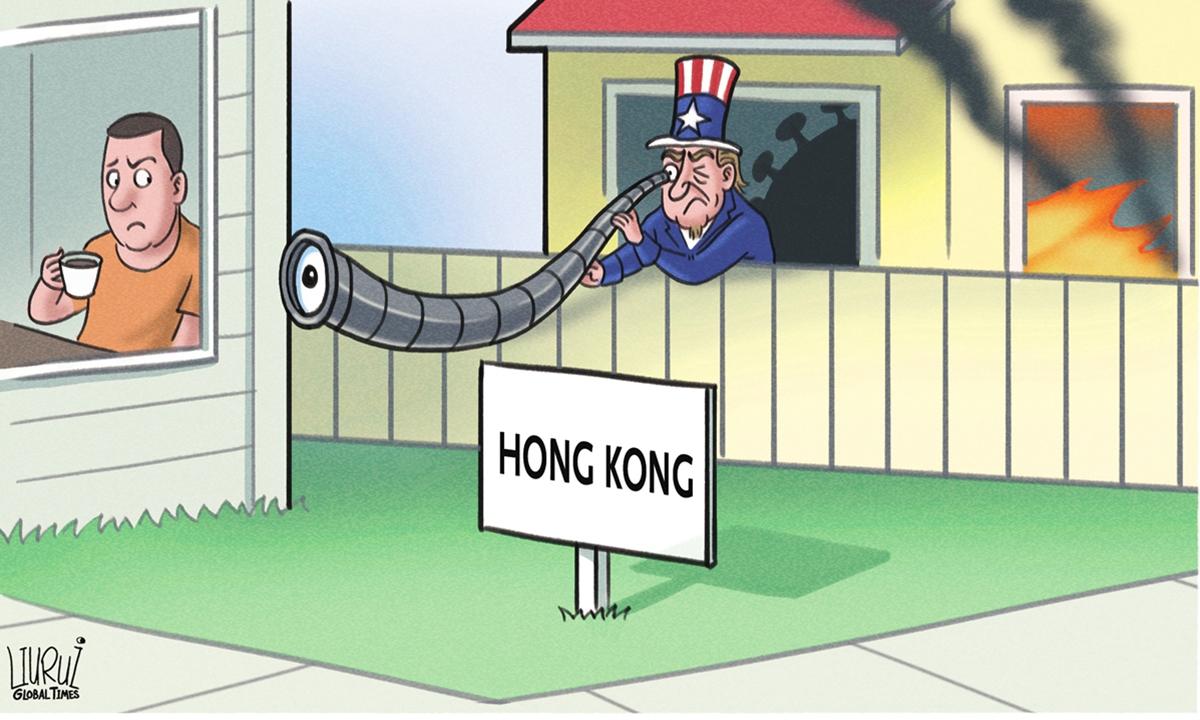Biden administration may use old tricks in dealing with Hong Kong
By Li Xiaobing Source: Global Times Published: 2020/12/13 15:03:40

Illustration: Liu Rui/GT
It has been over one month since the US 2020 presidential election. Even though the dust has not completely settled, the international community has paid close attention to the incoming administration of US President-elect Joe Biden.
In terms of Hong Kong affairs, the narratives and moves of the administration of US incumbent President Donald Trump have gravely jeopardized China-US relations. The current US government has resorted to nearly every conceivable means to meddle with the internal affairs of Hong Kong. These have ranged from groundless criticisms on the amendments to the extradition bill of the Hong Kong Special Administrative Region (HKSAR) government last year to signing into law the so-called Hong Kong Autonomy Act in July as a response to the National Security Law for Hong Kong. Furthermore, the Trump administration has also imposed travel bans and other sanctions of Chinese officials over their so-called crackdown on the opposition in Hong Kong. The US is also paring back Hong Kong's special status as well.
In a bid to get reelected, the Trump administration repeatedly played the China card, including passing the buck of its failure to curb the spread of the novel coronavirus pandemic. It also crazily lashed out at the Chinese central government over Hong Kong. However, it turns out that the playing China card and interfering in Hong Kong internal affairs failed to achieve Trump's political ambitions.
After Biden is officially sworn in as the 46th president of the US on January 20, 2021, many are wondering if he will continue to put pressure on Hong Kong like Trump. Will Biden take any new measures?
Comparatively speaking, Trump's campaign went generally straight to the point without spending too much time on tricks about human rights, democracy, and freedom. His moves aimed for immediate results.
Based on statements made by some politicians in Washington so far, some analysts in China have not ruled out the possibility that Biden will build on Trump's Hong Kong attack. This entails engaging in ideological struggles, which Democrats are good at. Biden's team will probably hence negatively assess the governance in Hong Kong. By doing so, it will aim to pressure the Chinese central government and HKSAR government to restart political reforms.
Many in the Biden administration and his advisors still don't want to abandon the time-tested ideological struggles against Beijing that have permeated US Democratic policies for decades. They are far too accustomed to this ideological line and don't want to change even though those are struggles and talking points are outdated.
Some US politicians are still grasping at straws for the so-called democratic deficit in Hong Kong. According to those politicians, the settlement to this deficit is key to many other problems in Hong Kong. Such an understanding is undoubtedly very naive and simple. Such policy stances lack in-depth of thinking and insight. More importantly, they fail to find out the essence of the Hong Kong issue.
This is a set of discourse system that the US always uses to provide explanations and judgments on the Hong Kong issue and forward US' own interests.
Politicians in Washington would be more adept at dealing with the issue if such logic and understanding are used to make decisions.
The Hong Kong issue will continue to be one of the near term and future focal points in the great game of the confrontation between China and the US. There are two aspects that the US may mainly focus on: the legal front and the public opinion war. Why? For one thing, the US has real interests in Hong Kong. American business elites will not let go of these interests. For another reason, politicians in Washington will spare no efforts to contain China's development.
Therefore, Washington can continue to introduce laws to punish China on the grounds of the Hong Kong issue. It will presumably engage in a more fierce and cruel competition with China over who can hold the microphone on the global public opinion stage to win the hearts and minds of the world.
One important reason for such US engagement pertains that the country is better at these practices. Although most Chinese people have already seen through the hypocrisy of the US, there are still possibilities that some politicians in other countries might choose the interpretation of Hong Kong issue based on their comfort zone that accords with their own interest when faced with mounting pressure amid the escalating China-US confrontation.
Therefore, the US will definitely make the most use of these practices.
After all, the country knows that it is a way that will allow it to have large benefit or even windfall with little investment.
The author is an associate professor and executive director of the Taiwan Hong Kong and Macao Laws Research Center of Nankai University School of Law. opinion@globaltimes.com.cn
Posted in: VIEWPOINT,CHINA-US